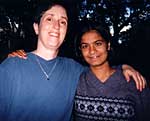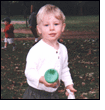One Family, Two Countries: Who Am I?
By Lynette Nyman
October , 2000
Part of the MPR project One Family, Two Countries
Children adopted from overseas are born into one culture and raised in another. They grow up aware that their origins are far different from their parents'. "Adoption tours" are gaining popularity for internationally-adopted children and their parents. Adoption experts say these are emotional journeys that can fulfill adopted children's desires to learn who they are.
RHEA WEINSTEIN is more complicated than a typical adolescent. She has layers of cultural identity that help shape how she sees herself. She's 13.
Like her older sister, Vita, Rhea was adopted from an orphanage in India when she was an infant. She grew up in south Minneapolis in a middle-class family. She and her sister have attended Indian culture camps where they learned about traditional food and dance. Their mother Miriam suggested they go.
"These kids have known from day one that they are adopted and that they're Indian and it's not like anybody is trying to hide anything or say it's good or bad or indifferent; it's just who they are," says Miriam.
This December, they'll take their first tour of India. It includes a stop at the orphanage where the girls lived. When Miriam first proposed the idea Rhea was afraid.
"It will exciting to see my country, because when I was there, I didn't know anything, because I was a baby," she says. "I think it will be emotional for going back to the orphanage and just remembering me being one of those kids in the orphanage and them wanting a family."
The trip may help Rhea more fully answer a fundamental human question: Who am I? For many internationally-adopted children answering this question involves going outside generally white, middle-class adoptive families.
University of Minnesota Professor Hal Grotevant researches culture and identity issues in adoption. He says children begin to wonder where they came from as soon as they recognize there are differences among people. Knowing about and having pride in their origins helps adopted children develop a healthy sense of self. He says for some, it's essential knowledge.
"It's almost like they need to do that before they can get on with other things," Grotevant says. "Other kids are very blase about it. As far as they're concerned, their parents are their parents and they are just not that interested in it."
The most passionate search for their birth parents. Some adoption tours offer that opportunity although it's not the focus of most. Situations may vary from an orphanage employee keeping a scrapbook of former orphans to visiting a village where a child's birth parents live. Grotevant says parents and children should prepare themselves and be respectful of the culture in which the children were born. For example not all societies are open about the reasons for adoption.
"Perhaps a young woman had a child out of wedlock and there is so much shame associated with that in that culture that to even approach that would be something unspeakable, or that would really create a very difficult situation for the child's birth parents," Grotevant says. "Usually when adoptive parents are doing that, they're not trying to make life difficult for the birth parents; they're trying to re-establish a connection."
In India, the identities of birth parents are generally not known. So Rhea and her sister, Vita, won't purse a search. Still, Vita says she'll have a chance to remember.
"It's part of a circle that this is where something began and this is the chance for me to see that, see the beginning for other people," she says.
Vita's advice to other internationally-adopted children is take comfortable steps in discovering yourself. She says it's not about changing who you are. It's about discovering who you are and identifying with that.
By Lynette Nyman
October , 2000
Part of the MPR project One Family, Two Countries
|
|
RealAudio 3.0 |
Children adopted from overseas are born into one culture and raised in another. They grow up aware that their origins are far different from their parents'. "Adoption tours" are gaining popularity for internationally-adopted children and their parents. Adoption experts say these are emotional journeys that can fulfill adopted children's desires to learn who they are.
| |
|
|
|
||
RHEA WEINSTEIN is more complicated than a typical adolescent. She has layers of cultural identity that help shape how she sees herself. She's 13.
Like her older sister, Vita, Rhea was adopted from an orphanage in India when she was an infant. She grew up in south Minneapolis in a middle-class family. She and her sister have attended Indian culture camps where they learned about traditional food and dance. Their mother Miriam suggested they go.
"These kids have known from day one that they are adopted and that they're Indian and it's not like anybody is trying to hide anything or say it's good or bad or indifferent; it's just who they are," says Miriam.
This December, they'll take their first tour of India. It includes a stop at the orphanage where the girls lived. When Miriam first proposed the idea Rhea was afraid.
"It will exciting to see my country, because when I was there, I didn't know anything, because I was a baby," she says. "I think it will be emotional for going back to the orphanage and just remembering me being one of those kids in the orphanage and them wanting a family."
The trip may help Rhea more fully answer a fundamental human question: Who am I? For many internationally-adopted children answering this question involves going outside generally white, middle-class adoptive families.
| |
|
|
|
||
University of Minnesota Professor Hal Grotevant researches culture and identity issues in adoption. He says children begin to wonder where they came from as soon as they recognize there are differences among people. Knowing about and having pride in their origins helps adopted children develop a healthy sense of self. He says for some, it's essential knowledge.
"It's almost like they need to do that before they can get on with other things," Grotevant says. "Other kids are very blase about it. As far as they're concerned, their parents are their parents and they are just not that interested in it."
The most passionate search for their birth parents. Some adoption tours offer that opportunity although it's not the focus of most. Situations may vary from an orphanage employee keeping a scrapbook of former orphans to visiting a village where a child's birth parents live. Grotevant says parents and children should prepare themselves and be respectful of the culture in which the children were born. For example not all societies are open about the reasons for adoption.
"Perhaps a young woman had a child out of wedlock and there is so much shame associated with that in that culture that to even approach that would be something unspeakable, or that would really create a very difficult situation for the child's birth parents," Grotevant says. "Usually when adoptive parents are doing that, they're not trying to make life difficult for the birth parents; they're trying to re-establish a connection."
In India, the identities of birth parents are generally not known. So Rhea and her sister, Vita, won't purse a search. Still, Vita says she'll have a chance to remember.
"It's part of a circle that this is where something began and this is the chance for me to see that, see the beginning for other people," she says.
Vita's advice to other internationally-adopted children is take comfortable steps in discovering yourself. She says it's not about changing who you are. It's about discovering who you are and identifying with that.


